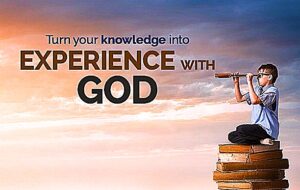Knowledge – BT11: The huge difference between knowing scripture and seeing God

Knowledge – BT11: The huge difference between knowing scripture and seeing God
Please follow the BLOG Etiquette to stay on topic and pass the moderator’s check. Bold, underlined text below = future links to the BLOG pages.
We’ve seen that the OT prophets who communicated directly with God did so through eido mentally ‘seeing’ perception/knowledge, something integral to the New Covenant promise now for every Christian (a), as realized by the Holy Spirit’s grace-gift of prophecy, even by visions and dreams (b), especially occurring during routine/habitual, patiently-waiting, watching, listening, worshipful, proseuche conversational-prayer. This ‘seeing’ isn’t reading a bible verse so many times that when you close your eyes, you can still “see” them in your mind’s eye. <Notes> a) Jeremiah 31:34, b) Acts 2:17-18, 38.
That is called “creative imagery or visualization” – a standard humanistic tool for improving memory, but also used a lot in New Age circles. Like visualization, sunesis ‘connect-the-dots’ rational, inductive learning can also include horao “observing/perceiving-knowing/discerning” or skopeo “fixing your attention on something” or theoreo “beholding something with particular interest” or noeo “observing, pondering, or considering with the nous mind.” All of these rational, cognitive processes are important to acquire gnosis info-knowledge about something or someone. That’s what the Jewish scribes and Pharisees were experts at – scriptural gnosis info-knowledge about God and His will! Bible students are like sports fans – they can quote you all the statistics about someone without ever personally knowing them!
The Jewish bible-expert scribes even changed their commandment to “Love God with all their “inner man” (a) or “heart” (b) . . . soul . . . strength” from Deuteronomy 6:5 as Jesus quoted it back to the scribes to answer their trick questions (c) – Jesus never taught the OT commandments! How did they change it? They snuck in “all your mind (d)” at the end. Maybe this got tagged on the more modern Greek versions, because although “in OT Hebrew physiology, the heart was considered the seat of the mind,” the Greeks wanted to somehow distinguish the heart from the mind – see Identity (e). <Notes> a) Hebrew: lebab, b) Greek: kardia, c) Matthew 22:37; Mark 12:30; Luke 10:27, d) dianoia: as a faculty for deep thinking, imagination, feeling, and desiring, e) Philippians 4:7; Revelation 2:23.
Look next how the Jewish scribe (an analytical bible-expert) rephrased what Jesus had said from using the word dianoia (a), which did include thinking and feeling, changing it to sunesis, which only included rational ‘connect-the-dots’ thinking: “You are right, Teacher. You have truly said … love God with all your sunesis mental ‘connect-the-dots’ rational, inductive, analytical understanding” (b)! These book-worms zeroed in on what mattered most to them, but that’s not the narrow focus Jesus was talking about at all! It’s not about head-knowledge but heartfelt experience as we shall see next! <Notes> a) dianoia: as a faculty for deep thinking, imagination, feeling, and desiring, b) Mark 11:33.
However Jesus said, “their eyes are closed, lest they eido mentally ‘see’ to perceive/know with their eyes and/coupled akouo hear/listen-to-understand with their ears and/coupled biyn/sunesis ‘connect-the-dots’ to understand with their lebab/kardia inner-man/heart and/coupled turn-back/return/revert/repent and/subsequently I would heal them” (a). As a Jew, Jesus considers “seeing, hearing, and understanding” as all internal processes from the inner-man/heart/mind used interchangeably, and He isn’t really distinguishing them as the Greeks would like to. <Notes> a) Matthew 13:15; John 12:40 citing Isaiah 6:10; cf. Acts 28:27.
Paul also knows it takes more than sunesis ‘connect-to-dots’ rational, inductive, analytical understanding, so he proseuchomai conversationally-prayed for Christians to “have the ‘eyes of their hearts’ enlightened/illuminated so that you may eido mentally ‘see’ to perceive/know what is the hope to which He has called you, what are the riches of His glorious inheritance, what is the immeasurable greatness of His enabling-power eis ‘toward and reaching the goal/purpose’ us are habitually/routinely having trusting-relying-faith” (a). a) Ephesians 1:18-19.
You can study this verse until you are blue in the face and never really get it until God shows it to your heart! 1 John 5:20 says, “We have already eido mentally ‘seen’ to perceive/know [with ongoing results] that the Son of God is ongoingly coming (as the Holy Spirit) and/coupled has already given [with ongoing results] us a dianoia mind (a) that we may/might experientially, relationally ginosko know Him (Son of God) who is The Truth, and/coupled we are in The Truth, in His Son Jesus Christ – this is the True God and zoe genuine-life everlasting.” That’s the dianoia mind that a Christian is to have – directly from Jesus, not indirectly through more scripture like how the Jews approached God! <Notes> a) as a faculty for deep thinking, imagination, feeling, and desiring.
So much of Christian teaching has encouraged rational, cognitive, analytical, inductive learning and expanding bible study to now include what they erroneously call, “New Testament scripture,” although graphe was never applied to NT writings until a Catholic theologian Tertullian 175 years after Christ died in 208 AD started to teach this, despite opposition by other well-known Church Fathers, resulting in another false teaching by the Catholic Church! But Jesus had this to say about the bible experts of His day: “You actually eido mentally ‘see’ to perceive/know absolutely-in-fact neither the scriptures (a) nor-absolutely-in-fact the enabling-power of God” (b) and “I experientially, relationally ginosko have known that you do absolutely-in-fact-NOT have the unconditional-love of God within you” (c). <Notes> a) John 20:9, b) Mark 12:24, c) John 5:42.
Furthermore, Paul said, “They have a zeal for God, but absolutely-in-fact-NOT kata down-from/according-to genuine, full, experiential, relational epignosis knowledge” (a), and includes these bible-experts in “the world [that] did not experientially, relationally ginosko know God thru-the-realizing-channel-of wisdom” (b), and from context the “wisdom of God” is the cross of Christ that the perishing world considers folly. <Notes> a) Romans 10:2, b) 1 Corinthians 1:21.
Bible students, like myself – see Bible Info-BT3, have a lot of accumulated sunesis ‘connect-the-dots’ rational, inductive, cognitive, analytical understanding and gnosis info-knowledge – see Bible Info, but because the “wisdom and understanding” of this world, even of the religions of the Jews and Greeks, led them nowhere, the NT writers rarely use either of these 2 words, especially as a phrase, positively. Instead they stress that we must be more than a zealous fanatical fan, collecting information about God to better understand Him and His will. Jesus said in John 10:14-15, “I am the Good Shepherd. I actually, ongoingly, experientially, relationally ginosko know Mine [sheep] and/coupled Mine [sheep] actually, ongoingly, experientially, relationally ginosko know Me, just as the Father experientially, relationally ginosko knows Me and/coupled I experientially, relationally ginosko know the Father.” Jesus and the Father aren’t reading books about each other!
Sure Jesus taught if they akouo “hear/listen-to-understand the logos message of the Kingdom but don’t ongoingly sunesis ‘connect-the-dots’ to understand it [by the heart], the evil one (devil, Satan) comes and snatches what was sown in his heart” (a). Throughout the NT, we see that NOT understanding [by the heart] Christ’s words and actions resulted in: bewilderment, astonishment, confusion, terror, denial, or hardening of hearts. However, the “connecting of the dots” has to go deeper than just the head and it’s certainly has got to stick: Only those “ongoingly holding fast/retaining the logos message in an honest/sincere and/coupled good/useful heart” will “bear/hold-onto fruit with patient endurance” (b). In many ways, the greatest distance between 2 points is between the head and the heart, from the page, past your thinking, and into your feelings – I know it is for me! <Notes> a) Matthew 13:19, b) Luke 8:11-15.
Spiritual Education, Knowledge of God and His Will, Knowing the bible versus seeing God, prophets know God thru eido mentally ‘seeing’ perception not bible-study, All Christians called to prophecy, All Christians called to ‘see’ in Conversational-Prayer, New Age creative imagery or visualization, Jesus wants us to prophetically see hear and feel with our hearts, eyes of our heart must be illuminated, Rationalism and Inductive reasoning won’t lead you to know God, zealous bible-study won’t lead you to a real knowledge of The Truth who is Jesus, Christ’s sheep hear His voice NOT read biographies about Him, The Truth has to dwell in our hearts NOT our head


